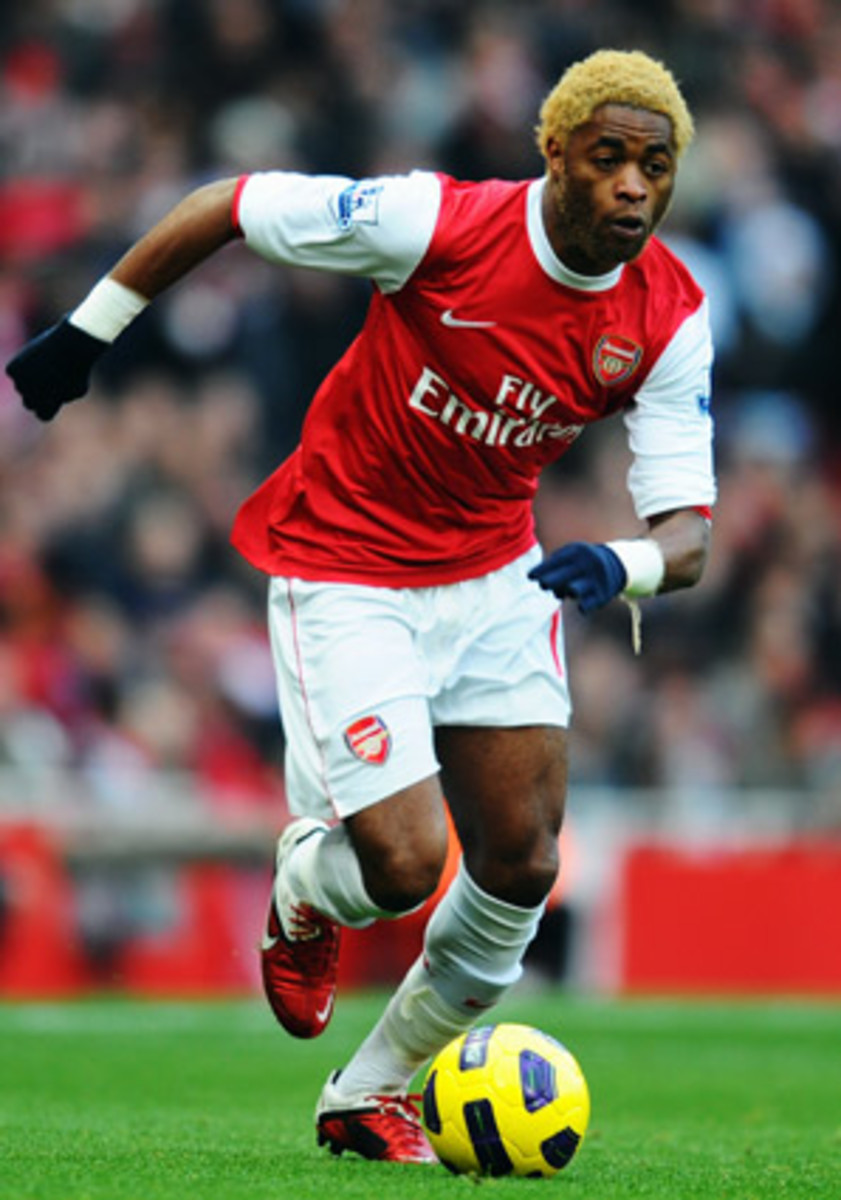
Song indispensable for Arsenal
Song was part of the Arsenal team that drew 2-2 with Barcelona at the Emirates Stadium in last season¹s quarterfinal. He was not involved in the return game, when Lionel Messi scored all four goals in a 4-1 win. ³"Last year we were missing a lot of key players in Barcelona: William Gallas, Robin van Persie and Cesc Fabregas were all out," Song told French TV station Canal Plus in an interview this week. "But if we have everyone fit, we don't need to fear Barcelona. In fact, when the draw was made, I just laughed."
Song has been an unsung hero in Arsenal¹s season so far, with his consistency in front of the back four, and a newfound eye for goal at the other end (he has five goals and five assists), ensuring Arsenal stay defensively solid whether playing a 4-3-3 formation or, as Arsene Wenger has done since the return of Van Persie, a 4-2-3-1. Samir Nasri, who could be out of Wednesday's match, may be in the running for the Player of the Year award but Song is arguably more indispensable to the team: it was his absence, and not Nasri's, that was bemoaned after Arsenal let slip a 4-0 lead to allow Newcastle to draw 4-4.
Song, still only 23, could make his 150th Arsenal appearance later this month -- not a bad return given that his family did not want him to take his soccer seriously, and encouraged him to focus on his education. So when he was offered a place on a Parisian local team aged 12, Song begged the coach to accompany him home to persuade his family to let him play.
Within two years, he moved to Bastia where coach Francois Ciccolini took him under his wing and set up his lodgings with a local French family, with whom he is still in regular contact. Ciccolini, a portly, brash, middle-aged Corsican, made for an unlikely mentor. When Ciccolini phoned Song in summer 2004 and told him to come back early to join the first team for preseason training, the youngster, then 16, thought it was a joke. His teammates included Nee and France's World Cup winner Christian Karembeu, who helped Song early on. "Christian took me aside and told me to stop charging around so much," said Song. "He taught me to control my energy and use it at the right time, and he was a big influence on me."
In 2005, after just one season in the top-flight, Song moved to Arsenal on loan for 12 months. His English was so poor, though, that when Dennis Bergkamp shook his hand in the dressing-room and said, "Welcome to Arsenal," Song had to ask Thierry Henry for a translation. When Song told his friends he was at Arsenal, most of them didn't believe him. He did enough to impress Wenger, though, and joined permanently for £1 million ($1.6M) the following summer.
But it took time for Song to cement his place in the team: he made only 16 league appearances in his first three seasons for Arsenal, and spent six months at Charlton where he played well but could not prevent it from relegation. While Song claimed he had no doubts about making it -- "I knew it was just a question of working hard and proving it to the coach," he said -- before the 2008-09 season began, his position in the squad was far from assured.
Wenger remained confident in the young Cameroonian, and told friends that Song had something intangible, "something in his eyes," that made him persist with him. Not for the first time, his judgment was spot on. Song is quick to credit Wenger, as well as Ciccolini, as the key men in his career (his father died when he was three and Song is close to his cousin, Rigobert Song, who holds Cameroon's appearance record with 137 games).
Whereas in previous seasons, Song was content to break up opposition attacks and start those of his own team, this year he has been given license to push forward, and encourage the team to hold a higher line. "I'm not just a defensive midfielder today, but I try and bring a bit more to the team," he said. His attacking prowess has also won over Arsenal's fans, who regularly chant, " Song, we've only got one Song, we¹ve only got one Song!" at home games.
In recent years, Wenger has allowed Lassana Diarra, then 23, and Mathieu Flamini, then 24, to leave Arsenal. Song has become more established than either of those two, and you suspect that Wenger would not be so willing to sell him. Song's true value to Arsenal might become apparent during their two matches against Barcelona. "We've learned from last year and talked about it," Song added. "We're all more mature now and we believe in our chances."
Ben Lyttleton has written about French football for various publications. He edited an oral history of the European Cup, Match of My Life: European Cup Finals, which was published in 2006.




